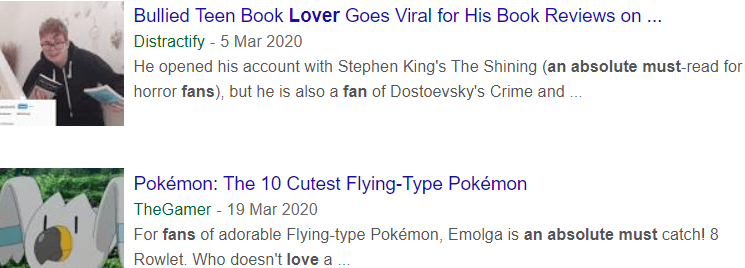B2 point 56 in the category of adjectives, in the English Grammar Profile, provides 3 specific degree adjectives as examples of limited range before a noun to express intensity.
This is a point that requires a great deal of interpretation. We cannot rely on part of speech software because “intensity” is not tagged!
For example: From the iWeb corpus
2 REAL WORLD 164564
3 REAL LIFE 164035 A2 in the EVP
I mean, did you in real life?
5 REAL THING 41238
7 REAL PROBLEM 35386 (this is one of the examples on the EGP)
8 REAL NAME 31869
9 REAL PEOPLE 29831
10 REAL DEAL 28306
11 REAL REASON 24150
12 REAL DIFFERENCE 22259
13 REAL VALUE 21195
14 REAL MONEY 18142
15 REAL ISSUE 16960
16 REAL QUESTION 16608
17 REAL FOOD 16371
18 REAL HOUSEWIVES 14796
19 REAL PERSON 14740
20 REAL SENSE 13668
we locate many nouns after “real” that do not meet our search criteria. There are linguistics books written on defining this point so it really is mostly out of the scope of this blog. In simple terms, it cannot be the literal meaning, so we are looking for more abstract gradable nouns. “REAL” is used (according to Collins Dictionary) for:
a situation or feeling to emphasize that it exists and is important or serious.
If we further examine “real problem” for collocates:
1 SOLVE (VVI ) 344
2 BECOMES (VVZ ) 226
3 LIES (VVZ_NN2 ) 214
4 SOLVING (VVG ) 183
5 BECOMING (VVG ) 168
6 SOLVES (VVZ ) 151
7 SOLVE (VV0 ) 91
8 PRESENTS (VVZ ) 89
9 ADDRESSING (VVG ) 77
10 ARISES (VVZ ) 74
OXFORD B2
Absolute before a noun = means total or complete and gives emphasis to what you are saying
absolute _nn
1 ABSOLUTE VALUE 8363
2 ABSOLUTE MUST 7461 (“must” is a noun here)
1 AN (AT1 ) 7756
2 ANYONE (PN1 ) 237
3 FANS (NN2 ) 68
4 LOVERS (NN2 ) 48
5 VISITING (VVG_JJ ) 35
3 ABSOLUTE DISCRETION 6573
4 ABSOLUTE POWER 5016
5 ABSOLUTE MINIMUM 4859
6 ABSOLUTE NECESSITY 4694
7 ABSOLUTE TRUTH 4289
8 ABSOLUTE ZERO 3911
9 ABSOLUTE FAVORITE 3749
10 ABSOLUTE PLEASURE 3654
11 ABSOLUTE CERTAINTY 3537
12 ABSOLUTE PATH 3083
13 ABSOLUTE TERMS 2990
14 ABSOLUTE CONTROL 2604
15 ABSOLUTE BLAST 2557
16 ABSOLUTE RIGHT 2413
17 ABSOLUTE JOY 2193
You make this job an absolute joy.
18 ABSOLUTE VALUES 2017
19 ABSOLUTE BEGINNERS 1946
20 ABSOLUTE PERFECTION 1748
complete _nn
1 COMPLETE LIST 37137
2 COMPLETE CONTROL 25913
3 COMPLETE SET 17829
4 COMPLETE GUIDE 10959
5 COMPLETE PICTURE 10349
6 COMPLETE INFORMATION 9737
7 COMPLETE LACK 9317
8 COMPLETE REVIEW 8064
9 COMPLETE PACKAGE 7922
10 COMPLETE RANGE 7856
11 COMPLETE DETAILS 7676
12 COMPLETE LINE 7157
13 COMPLETE GAME 7139
14 COMPLETE SOLUTION 6499
15 COMPLETE SYSTEM 6281
16 COMPLETE WASTE 5912
1 TIME (NNT1 ) 3217
2 MONEY (NN1 ) 1520
3 SPACE (NN1 ) 160
4 RESOURCES (NN2 ) 102
5 EFFORT (NN1 ) 76
17 COMPLETE UNDERSTANDING 5298
18 COMPLETE LISTING 5053
19 COMPLETE STRANGERS 5013
1 EVEN (RR ) 326
2 FRIENDS (NN2 ) 268
3 FAMILY (NN1 ) 155
4 CONVERSATIONS (NN2 )
5 ASKING (VVG ) 44
20 COMPLETE APPLICATION 4893







Absolute, complete, total and utter are used to express strong feelings, extreme situations, and other events – especially negative experiences.
Absolute agony
Complete astonishment
Total bliss
(An) utter catastrophe
Absolute despair
Total ecstasy
Utter fury
A complete idiot
Utter loathing
Total madness
Beare, Kenneth. (2020, February 11). How to Use Intensifying Adjectives. Retrieved from https://www.thoughtco.com/intensifying-adjectives-in-english-grammar-1211138